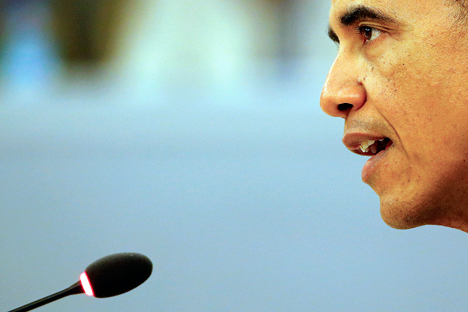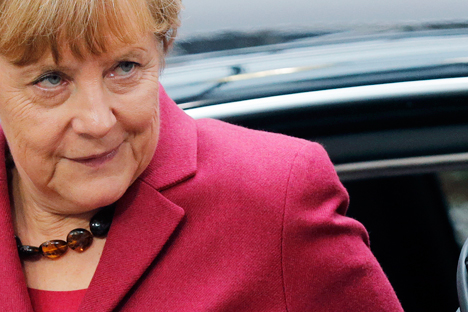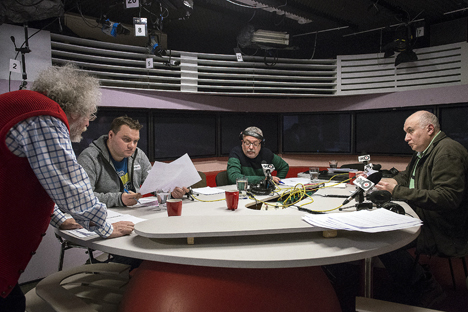Press Digest: Gulf states push U.S. toward change in tactics in Middle East

Indications are that the U.S. is changing its approach to Syria and the war against ISIS jihadists - what are Russian media saying about this? Source: Reuters
Due to the influence of the Arabian monarchies, the U.S. is changing its strategy in fighting the radical Islamic State militant group (ISIS), writes the Nezavisimaya Gazeta newspaper. U.S. President Barack Obama has ordered a review of the strategy for fighting the group: Washington has admitted that the initial plan not to remove Syrian leader Bashar Al Assad was wrong. Now Washington believes that it will probably not be possible to defeat ISIS without political changes in Damascus and the removal of the Syrian president from power, according to Nezavisimaya Gazeta.
The publication reminds its readers that the Iraq First strategy was supposed to create time for the preparations of a pro-Western opposition, which is mainly represented by the Free Syrian Army. Now Washington doubts the strategy's plausibility: By the time ISIS is annihilated in Iraq, the Free Syrian Army may be weakened or even destroyed. In other words, the article concludes, Washington is convinced of the necessity of regime change in Damascus,
In an interview with Nezavisimaya Gazeta, President of the Institute of Religion and Politics Alexander Ignatenko underlines that the U.S. is being heavily influenced by countries that are using Islamic State as an instrument for their own objectives. "They include Turkey, which is doing everything so that ISIS weakens the Kurds as much as possible, as well as the Arabian monarchies, in particular Qatar and Saudi Arabia," says Ignatenko.
Stanislav Ivanov, leading collaborator at the IMEMO Center of International Security and the Russian Academy of Sciences Institute of Oriental Studies, explains that the U.S. is betting on increasing its military and other type of aid to the Free Syrian Army. "They are calculating that the blockade will sooner or later bear fruit and someone else will remove Assad, without America or NATO's direct military intervention," added Ivanov.
Russian media attention is still focused on the possible introduction of new sanctions against Russia. The Kommersant newspaper writes that, in anticipation of the Nov. 17 meeting of the EU countries' foreign ministers in Brussels, yesterday European diplomats held a closed meeting with their American counterparts. The key theme was the possible introduction of sanctions against Moscow and the self-proclaimed republics of the Donbass region of eastern Ukraine.
On the eve of the meeting Washington made it clear, adds the newspaper, that there are grounds for introducing new restrictive measures. "We are worried about the continuous grave violations of the Minsk Agreements by Russia and the militias," Kommersant writes, citing U.S. Department of State Spokeswoman Jennifer Psaki, who said that America's partners “should be prepared to expand and intensify the existing sanctions." Brussels, judging by comments voiced by EU Foreign Ministry representative Maya Kotsiyanchich, is ready for this scenario.
Kommersant sources in the U.S. and EU foreign ministries specify that the term "grave violations" means not only the illegal, from the West's point of view, Nov. 2 elections in the Donetsk and Lugansk regions, but also the "activation of the transfer of Russian armed forces and heavy equipment to southeastern Ukraine." The pro-autonomy forces are actively increasing their military potential, said one of the newspaper's sources, and "this could not have happened without support from outside."
The Moskovsky Komsomolets newspaper writes that, according to an invitation sent to Moscow, France should deliver the first Mistral amphibious assault ship to the Russian Navy on Nov. 14. However, it is still not clear when the transfer will actually be made: The Russian delegation has still not parted for France, while the French side has neither withdrawn nor confirmed its invitation.
The newspaper reminded its readers that earlier Russian Deputy Prime Minister Dmitry Rogozin, who is in charge of the defense industry, announced that Russia’s state arms export agency Rosoboronexport had received a letter from DCNS, the French shipbuilder carrying out the contract for the Mistrals, inviting the Russian delegates to a ceremony transferring the Vladivostok carrier on Nov. 14.
On the eve of the transfer the French Nouvel Observateur daily wrote that Russia had not fabricated the invitation and that the Novю 14 date indeed exists. French officials had received the same letter, adds Moskovsky Komsomolets. Earlier there was information saying that the date of the first Mistral's transfer would be postponed for three months, since this possibility is included in the contract, explains the publication.
All rights reserved by Rossiyskaya Gazeta.
Subscribe
to our newsletter!
Get the week's best stories straight to your inbox

